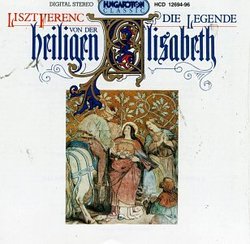| All Artists: Istvan Gati, Sandor Solyom-Nagy, Franz Liszt, Arpad Joo, Hungarian State Symphony Orchestra, Andras Virag, Eva Farkas, Eva Marton, József Gregor, Kolos Kovats Title: Liszt: Die Legende Heiligen von der Elisabeth Members Wishing: 1 Total Copies: 0 Label: Hungaroton Release Date: 8/1/1996 Album Type: Import Genre: Classical Style: Opera & Classical Vocal Number of Discs: 3 SwapaCD Credits: 3 UPCs: 750582161322, 5991811269425 |
Search - Istvan Gati, Sandor Solyom-Nagy, Franz Liszt :: Liszt: Die Legende Heiligen von der Elisabeth
 | Istvan Gati, Sandor Solyom-Nagy, Franz Liszt Liszt: Die Legende Heiligen von der Elisabeth Genre: Classical
Mahler admired this piece very much, but it has not received anything like the attention it deserves. This is, in fact, its only recording, and thank heaven it's such a fine one. St. Elizabeth of Hungary is one of the patr... more » |
Larger Image |
CD DetailsSynopsis
Amazon.com Mahler admired this piece very much, but it has not received anything like the attention it deserves. This is, in fact, its only recording, and thank heaven it's such a fine one. St. Elizabeth of Hungary is one of the patron saints of the poor and downtrodden. A woman of uncompromising goodness and strength of character, she suffers a series of misfortunes (she loses her husband in war, gets thrown out of her home by her mother-in-law, has her children taken away) but retains her faith until her death in utter poverty. Liszt had a strong social conscience; he cared about the poor, and he lavished an enormous amount of care on this moving tribute to their divine protector. It may be something of a curiosity, but it's a worthy one. --David Hurwitz Similar CDs
|
CD ReviewsUnfortunately not as powerful as it could be J. Anderson | 09/30/1999 (3 out of 5 stars) "After a long search, I have finally found a published, technically high quality, recording of this almost forgotten work. Listening in into the various tracks however quickly provided me with a disappointment as the recording pales in comparison with the Michael Gielen / SWF Symphony Orchestra interpretation of the mid-80's that was, much to my chagrin, only played on radio and never released on CD. In the present recording, the conductor just does not work out the brilliant nuances of this work as well as Gielen does, reducing Liszt's genius to a merely beautiful, but no longer outstanding piece of classical music. I will probably have to wait many more years before this work will have justice done to it in a CD recording by someone who provides an interpretation as dedicated as Gielen's. Still recommended - unless you have the luck to be able to record Gielen's performance off the radio someday." Arpad Joo will astonish you! J. Anderson | Monterey, CA USA | 03/04/2001 (4 out of 5 stars) "I listened to this recording again after some time away from it, and found it remarkably durable. The music itself is a different Liszt, not another side of Liszt, but a Liszt with different eyes. Many's the passage that makes one wish he had written opera - instead of all those transcriptions, although that's an entirely different piece of cake again.. Eva Marton is surprising, both in voice and vocal temperament, it's my experience she always sings well when she's with her Hungarian compatriots; her Hungarian concert video is another example. The State Orchestra is never ravishing (although sometimes their Bartok shakes the seats), but they love Marton and play above themselves here. There are a number of exquisite passages of orchestral playing on this recording. Farkas contributes up to her usual demanding standard, and Gregor, especially, leads the male singers in this recording to unexpected heights. His middle voice is everything right all of the time. But the star here is Arpad Joo! I think his conception of this piece is mightier than it deserves, and by that generous assent, he raises it to genuine art. This is real conducting of notable intensity, with excruciating detail attendant to the blueprint of Franz Liszt. Fine as the constituent elements are, I think it's a great recording on Joo's account; one unwise to miss if this kind of magico-sacral explosion is at all to your taste."
|

 Track Listings (10) - Disc #1
Track Listings (10) - Disc #1
